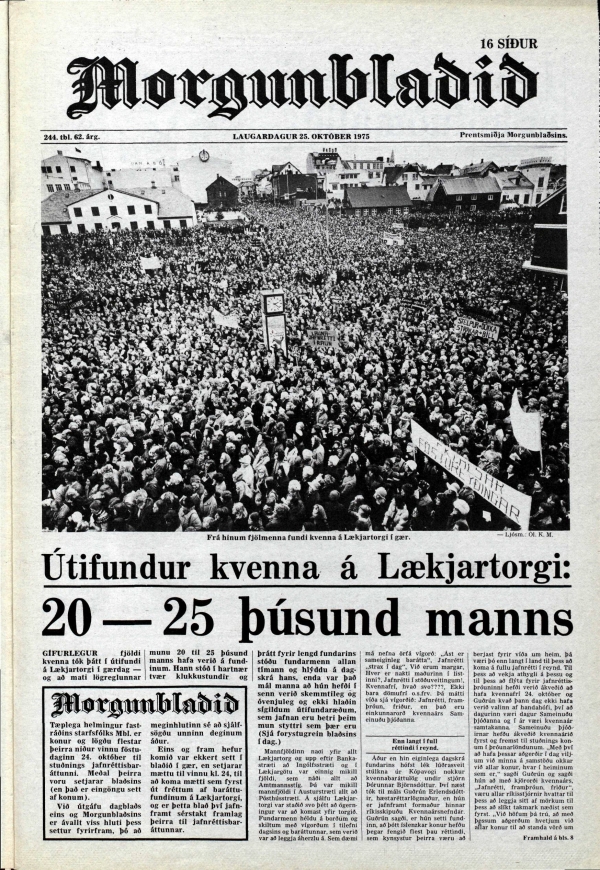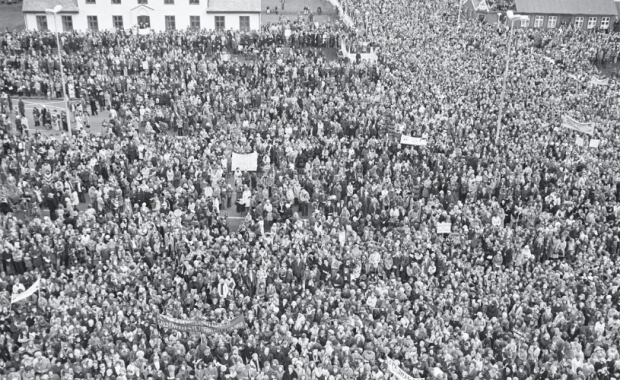At 14.38 (2.38pm) today women will leave their workplace around Iceland to protest the gender pay gap. According to Statistics Iceland (link in Icelandic) women, on average, earn 17% less than men as measured by Eurostat.
In Reykjavík women will stage a mass protest at 15.15 (3.15pm) in the centre of the capital. All are welcome to join in to show their solidarity with the cause.
The timing today is when women on average stop to get paid during the day, when compared to men in same professions.
The gap has narrowed in recent years, but the progress is very slow and with the same pace women are expected to reach pay equity with men in 2068.

The date for the action is no coincidence as 24 October has a special place in the history of women's rights movement in Iceland. On that date in October 1975 every nine out of ten Icelandic women went on a strike, which they announced simply as a Women’s Day Off (Kvennafrídagurinn). Women abandoned their duties and flocked to the center of the capital to demonstrate that what their husbands and bosses had used to take for granted has a high value and should be appreciated. The date has been commemorated and used for mass demonstrations before, in 1985, 2005 and 2010.
Although we can do better, nowhere in the world have greater strides been taken to closing the gender gap than in Iceland. For seven consecutive years Iceland has topped the annual Global Gender Report by the World Economic Forum.
The report examines four overall areas of inequality between men and women in 145 countries around the globe. The rankings are based on a country's performance in:
1) Economic participation and opportunity – outcomes on salaries, participation levels and access to high-skilled employment.
2) Educational attainment – outcomes on access to basic and higher level education.
3) Political empowerment – outcomes on representation in decision-making structures.
4) Health and survival – outcomes on life expectancy and sex ratio.
In 1980 Vigdís Finnbogadóttir was voted the president of Iceland she became the world’s first democratically elected female president and in 2009 Jóhanna Sigurðardóttir became the world's first openly lesbian head of government and was hailed like a rockstar by feminists worldwide when she made efforts to ban strip clubs, explaining it as a necessary measure to bring about justice, which is impossible, as she concluded, when women are treated like commodities.
Here you can read more about the Icelandic women who became the no 1 first in history.
At 14.38 (2.38pm) today women will leave their workplace around Iceland to protest the gender pay gap. According to Statistics Iceland (link in Icelandic) women, on average, earn 17% less than men as measured by Eurostat.
In Reykjavík women will stage a mass protest at 15.15 (3.15pm) in the centre of the capital. All are welcome to join in to show their solidarity with the cause.
The timing today is when women on average stop to get paid during the day, when compared to men in same professions.
The gap has narrowed in recent years, but the progress is very slow and with the same pace women are expected to reach pay equity with men in 2068.

The date for the action is no coincidence as 24 October has a special place in the history of women's rights movement in Iceland. On that date in October 1975 every nine out of ten Icelandic women went on a strike, which they announced simply as a Women’s Day Off (Kvennafrídagurinn). Women abandoned their duties and flocked to the center of the capital to demonstrate that what their husbands and bosses had used to take for granted has a high value and should be appreciated. The date has been commemorated and used for mass demonstrations before, in 1985, 2005 and 2010.
Although we can do better, nowhere in the world have greater strides been taken to closing the gender gap than in Iceland. For seven consecutive years Iceland has topped the annual Global Gender Report by the World Economic Forum.
The report examines four overall areas of inequality between men and women in 145 countries around the globe. The rankings are based on a country's performance in:
1) Economic participation and opportunity – outcomes on salaries, participation levels and access to high-skilled employment.
2) Educational attainment – outcomes on access to basic and higher level education.
3) Political empowerment – outcomes on representation in decision-making structures.
4) Health and survival – outcomes on life expectancy and sex ratio.
In 1980 Vigdís Finnbogadóttir was voted the president of Iceland she became the world’s first democratically elected female president and in 2009 Jóhanna Sigurðardóttir became the world's first openly lesbian head of government and was hailed like a rockstar by feminists worldwide when she made efforts to ban strip clubs, explaining it as a necessary measure to bring about justice, which is impossible, as she concluded, when women are treated like commodities.
Here you can read more about the Icelandic women who became the no 1 first in history.







